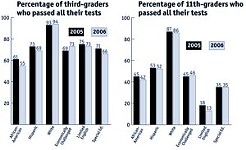Charter School Earns an F
The Texas Academy of Excellence fails accounting (and ethics)
By Rachel Proctor May, Fri., July 2, 2004

The Texas Education Agency has no idea what the Texas Academy of Excellence did with the $6.5 million the East Austin charter school has received from the state since it opened its doors in 1996.
Well, not quite "no" idea. The school's administrators were clearly paying rent on their facilities (until they stopped doing so and got sued by the former landlord), as well as writing paychecks for teachers (until they started bouncing), and delivering taxes to the IRS (except when they didn't). But after spending four months trying to audit the Academy, the TEA finally released a report saying the school's haphazard, incomplete, and missing records make it impossible to tell exactly what the school did with its money.
The TEA has not revoked the school's charter – it doesn't have to. The Academy is in such heavy debt it couldn't possibly operate, and teachers say they've been told to find work elsewhere in the fall. Now the question is what the TEA can do to recover squandered public-education dollars. "Rest assured we will use tools that the law gives us to seek reimbursement of those funds," said TEA lawyer Jim Thompson.
But that will be easier said than done.
The Academy's long-simmering financial woes boiled over this spring, when the former landlord froze the school's accounts. As paychecks bounced and vendors stopped making deliveries, Academy administrators responded by filing for bankruptcy. Citing the sorry state of the Academy's records, the judge dismissed the case and sent the problem back to the TEA to sort out.
The TEA isn't trying to get the whole $6.5 million back; rather, the agency seeks a little less than $1 million to pay back grants whose rules require clear documentation that they went to their intended use, such as reading programs or school breakfasts. It also wants back the money the Academy spent on an early childhood program at an unapproved site.
Thompson says some of that debt will be covered by the state payments the Academy was scheduled to receive for the remainder of the 2003-04 school year. In other words, the TEA will be using more public education funds (about $312,000) to pay off a chunk of the Academy's debts. But that still leaves about $670,000. The TEA could file suit against the Academy, but the school is completely broke, heavily in debt, and has no assets to seize. Some Academy teachers and parents have an idea, though – holding the administrators, particularly Superintendent Dolores Hillyer, personally responsible.
"It's wrong what they did," said Brooke Dennis, whose three children attended the Academy. "The teachers always worked so hard, and they wouldn't pay them, or if they did the checks would bounce. I think they should do something to [the administrators]."
Thompson says the TEA won't be going after anyone personally, even though the audit does raise questions about whether administrators used public funds for private purposes. School records show money was spent at department stores like Neiman Marcus and Best Buy, but with no indication of what was purchased. Academy money was also spent in cities around the world, including London, Madrid, Nairobi, and Johannesburg, at roughly the same time that Hillyer was on a trip to Spain.
Despite her anger at the management, Dennis is disappointed that the school is closing. She moved her children out of AISD when she grew frustrated at a teacher trying to classify her son as a special-education student, and was pleased with the teachers at the Academy. "I hate that the school is closed, because my kids were being taught," said Dennis.
A serious question is whether the TEA could have either saved the school or saved the state some money, had it acted sooner. The TEA does not directly oversee charter schools' finances, but it requires each school to submit an independent audit each year. Thompson says that the TEA was aware that the Academy was having some problems, and that it had placed it on the list of schools to be investigated (he said about a dozen of the roughly 200 charter schools in Texas are in that queue). But he said the TEA was justified in not acting sooner.
"All three of those reports [that the Academy submitted before this year] clearly indicated that at the time that auditor looked at those books, those books existed," he said. "But the question is, why aren't they there now? It appears something has happened to those records." However, the very fact that the school submitted only three "annual" audits since 1996 should have been a red flag. Plus, the audits cite the school for grossly incomplete records as early as 1997-98.
What that means to Carolyn Boyle of the Coalition for Public Schools is that the TEA needs to watch charter schools more closely. She says that in 2002 she testified before a House committee about the need to reform charter rules to improve accountability, but the committee's report was buried by House leadership. But even under the current rules, she says, the TEA could do a much better job of protecting public funds, as well as charter school students. "The commissioner of education should be much more aggressive in immediately invoking sanctions when a charter school does not file its annual audit by the statutory deadline or an audit indicates financial mismanagement," she said.
Got something to say on the subject? Send a letter to the editor.










